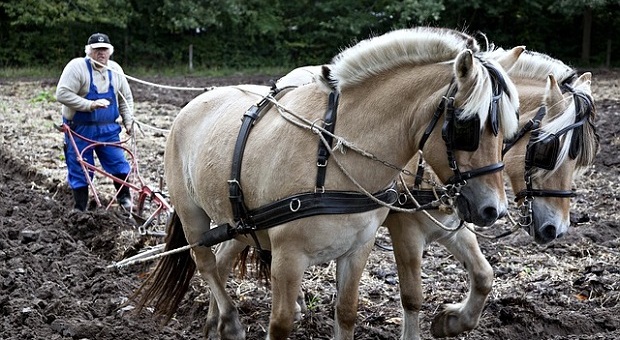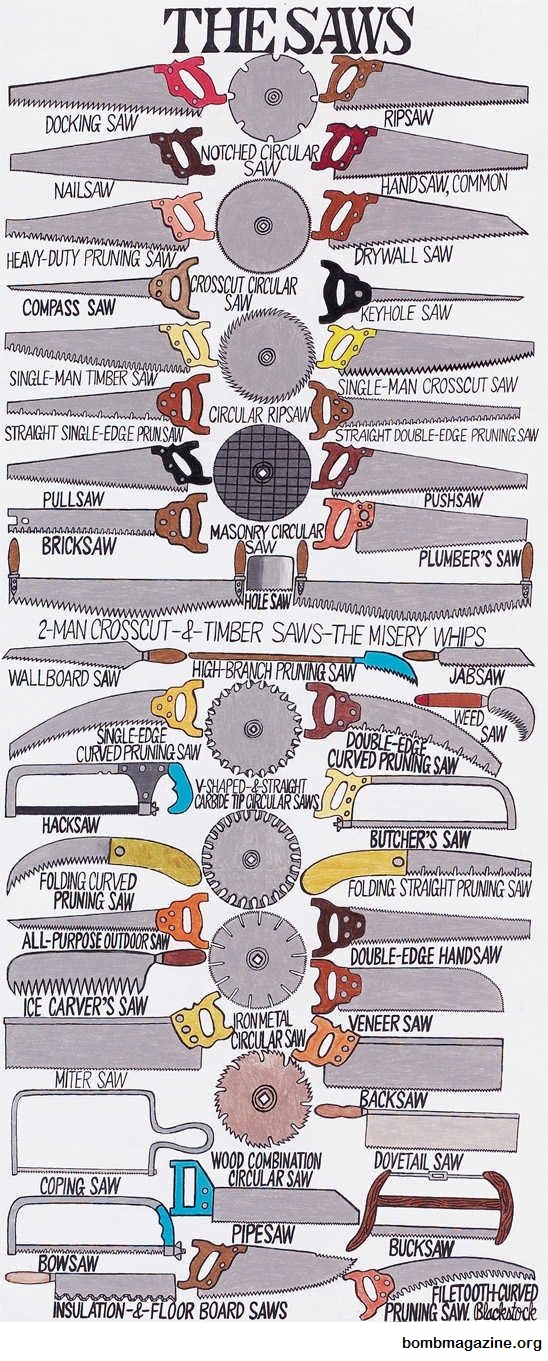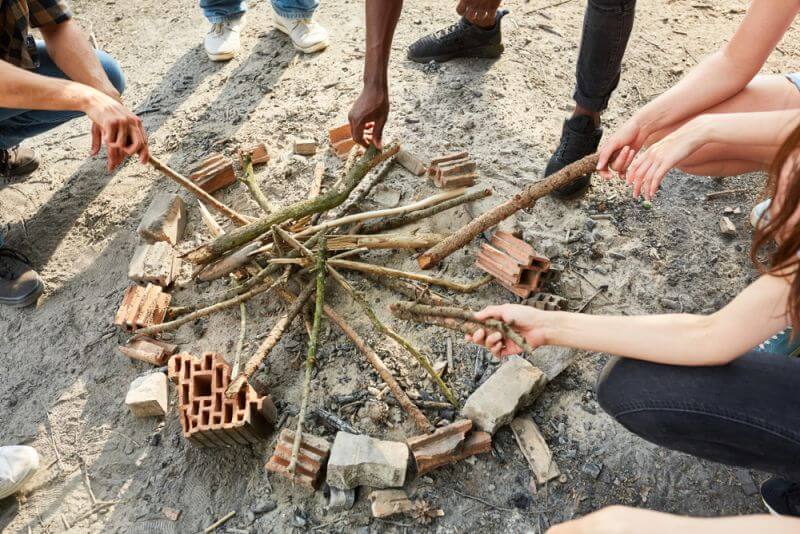What kind of vehicles and equipment do you use every day? What would you use instead in a SHTF world without the power grid?
When modern equipment won’t work anymore, the prepared have a plan in place. They know that with a little ingenuity and some elbow grease, they can get the job done. But a willingness to work won’t get you very far if you don’t have a pile of materials to work with.
Using What You Have
Modern-day preppers can learn a lot from the Depression era mentality of saving. I know that I have!
My Grandpa never threw anything away. When we first moved back to the family property, I thought his old junk pile was an eyesore. Tires. Old tractors. Tons of screws, bolts, and who knows what else. It was a huge pile of junk.
In today’s use it and toss it society, I simply couldn’t fathom why in the world my Grandpa kept this junk. I was embarrassed by it. I wanted to scoop it all up and take it to the dump. Thankfully, we couldn’t afford to do that.
Because over the years since we’ve been back, I’ve realized the true value of that junk pile. We’ve taken parts from equipment of old to fix what is broken. We’ve used scrap metal and junk to fill a need and solve problems around the homestead. And we’ve saved a lot of money.
That junk pile? I no longer view it as junk. I think of it as our insurance. You see—when the day comes that we can’t just go buy something, we’ll have a leg-up. We’ll have stuff to work with.
So if you don’t have a junk pile of your own, I’d recommend you start one. If you have property, just gather your junk in a remote corner. If you don’t, you’ll have to think creatively.
Can you save extra nuts and bolts in a drawer in the garage? Can you partner with a country friend to create a joint pile? Can you devote a closet to accumulating odds and ends?
As odd as it may seem to save junk, recycling and reusing becomes crucial when the modern economy is gone. You simply won’t be able to go buy what you need. You’ll have to use what you have.
1. Make a List!
What kind of automated systems are you running right now? Since each of us have a different lifestyle and processes, we won’t all need the exact same things.
To figure out what you need, you have to make a list. Grab a piece of paper and write down all of the systems you’re currently using that run on electricity and modern machinery. Here’s some common ones to get you thinking:
- Milking machines
- Automated sprinklers for the garden
- Tractor for plowing the field
- Rototillers for the garden
- Irrigation systems
- Lights
- Food storage (fridge and freezer)
- Laundry care
- Cooking
- Personal vehicles to get from place to place
- Heating a greenhouse to grow food year round
You’ll probably have more to add. Most of us are very dependent on modern innovations in today’s life. Now that you have your list, it’s time to start thinking through SHTF scenarios. Let’s work through a couple together:
Milking the Animals
How would you milk your cows if you had no power?
If you only have a couple of cows, you’ll probably be able to switch to hand milking. You might even get away with switching to once a day milking depending on how much milk your ladies are giving.
But, what if you have a whole herd and depended on a milker? What powers your machine milker? Do you know how your vacuum pump works? How will you clean the pieces if you don’t have running water?
Learn everything you can about the mechanics behind the automated systems you use every day. Read the manual. Study how the pieces work together. The more familiar you are with the parts and pieces, the more likely you’ll be able to repair it when the time comes. You’ll also know what sorts of extra parts to start stock piling.
Vehicles
When vehicles first came out, they were fairly simple machines. Most people could handle their own repairs. With today’s chips, computers, and complexity, that’s no longer the case.
These detailed systems often require specialized tools and scanning software to repair. There isn’t much you can do yourself without a large amount of mechanical knowledge. You might want to consider having an older vehicle around, just because it’s easier to work on.
They’re also more likely to run after an EMP. Here’s a great Survivopedia post on the best vehicles for an EMP event.
No matter what you’re driving, it’s essential that you start learning to repair it. If your car is broken, do some basic troubleshooting yourself. Every time you do this, you’re improving your mechanical ability.
If you take your car to the mechanic, learn all you can. Ask to see the broken part and where it was in your vehicle. You’ll learn more about your car, and start building a relationship with someone local with a mechanically minded skill-set. Or you can chose to grow animals for transportation.
Growing Food
You can’t just plop a variety of seeds in the ground and expect to magically grow enough food to feed yourself and your family for the entire year. There’s a lot of work between planting and harvesting. Many people rely on automated systems to do a portion of this work. From tractors to electricity or automatic watering systems, food production hasn’t escaped modern marvels.
Take a look at what you’re currently doing for food production. Do you run a rototiller over the ground each year? If so, it’s time to think about switching to a no-till method of gardening.
In this method, you prepare your soil initially before planting. Then you cover it with a thick layer of mulch. When it’s time to plant, you gently remove some of the mulch, and bury your seeds.
As your plants grow, the mulch holds in water, which is essential in a crisis situation. You continue to add compost and mulch to your garden. But, instead of digging the new stuff in, you just top-dress it by adding layer upon layer up on top.
This same method works in the field as well, though on a larger scale. Instead of a plow to prep the field for planting, you’d use a harrow. The impact on the land is a lot less, as harrows pierce the ground instead of turning it over.
Harrows are also more energy efficient since you can plant at the same time. That means only one trip around the field is needed instead of multiple.
Large Equipment
If your farm equipment fails, do you have a backup plan? Some people keep horses around, but horses aren’t the only animal that can work a field. Dexter cattle have been called a tri-purpose cow because they’re good for meat, milk, and work.
You’ll probably need to do some innovating to get your equipment to pull by animal instead of machine. Harnesses will be essential to keep your animal safe while working.
You can look for older equipment now, while you still have the benefit of used marketplaces. Horse drawn machinery are often cheaper than their modern counterparts, and they’re also easier to work on.
Video first seen on jamminjamy.
Watering
It’s not only the planting of the field that you should think about, it’s also the watering. Water typically runs on a pump. If you don’t have power, you’ll lose the accessibility of water. Gravity fed systems are one solution.
Look for an elevated area on your property where you can collect rainwater.
If you prepare a large container with a hose connector and a plug down low, you’ll be set to use the water. When it’s time to water, hook a hose up to the container. Gravity will force the water through the hose to where you need it. Just be sure to put the plug back on your system when you’re finished.
You can also build a series of wooden troughs to carry water from a waterfall or creek if you have one on your property. This one requires a little more mechanical know-how, as you’ll have to ensure your angles are correct. Otherwise the water won’t flow.
Harvest Time
To harvest your plants without machinery, you’ll need to learn how it was done in the past. If you’re growing your own wheat, instead of a combine you’ll need a scythe to cut it. You’ll also need to think through the threshing.
Only you know exactly what you’ll need to switch your automated systems over to manual ones. You’ll definitely need to have raw materials and tools on hand to keep your systems in good repair. But what can you do right now to start this process?
2. Stock Up on Printed Resources
There are plenty of books and details online that walk you through the systems you need. Now is the perfect time to stock up on printed research materials. After all, you won’t be able to do a whole lot of surfing the internet after the SHTF.
You won’t be able to learn everything in one sitting. That’s why having printed material is so beneficial. When you need it, you’ll be able to pull it out and learn on the go.
3. Develop a Repair or Reuse Mindset
When something breaks, it’s so easy to throw it away and buy another one. But, that attitude won’t get you very far in a crisis. Starting today, take time to learn about what’s broken.
If it’s something you were going to throw away anyways, you have nothing to lose. Examine the parts. See if you can pinpoint what failed. Then take it apart and see how everything fits together.
You might discover it was something simple that you can fix. If not, you gained valuable experience in troubleshooting and disassembly. Those skills will be crucial in the future.
Instead of throwing away things that break, see if you can come up with a more innovative solution. Can you pull the components and save them for an upcoming project? Can you hang onto the gears?
You might not have the space to save everything. That’s why it’s essential to have your list. What items will you use the most to keep your needed systems up and running?
4. Develop Your Creativity and Innovation
Instead of going out and buying something new, think creatively. Is there any other way to do what you need to do? Can you reuse something, or build a DIY model?
This will put your creative thinking skills to work. You’ll start thinking outside of the box. But just coming up with ideas isn’t enough. Innovation is the ability to put those skills to use to solve a problem.
5. Improve Your Mechanical Mind
Some people are naturally gifted in the area of mechanics. They’re tinkerers, always working on something. Others don’t have this natural ability. But, everyone can learn. If you’re not mechanically inclined, start asking questions. Watch what others do. Learn from them.
6. Carry Tools
You never know when you might need a screwdriver or a knife. If you aren’t currently carrying a multi-tool, start.
Put a basic repair kit in your car, and know how to use the tools in it. If you leave your vehicle in an emergency, you’ll be able to grab a couple of tools. Those may make the difference between you making it home or not.
7. Invest in Hand Tools
You’ll also want to build a solid supply of hand tools around your homestead. Think beyond the screwdriver and hammer. How would you cut firewood without a chainsaw? Pick up a hand saw that you can use if you need to.
8. Learn the Basics
While you can’t learn everything there is to know, you can learn a little about a lot of things. Here are some things to study that’ll help you be better prepared:
Every bit of knowledge and hands on mechanical experience you gain will help make you stronger in the future.
What’s your biggest struggle when it comes to off-grid mechanics? What systems would you have to replace? Could you survive off-grid, living the life our ancestors lived? Click on the banner below to find out more about their way of living and use their secrets for your survival.
This article has been written by Lisa Tanner for Survivopedia.











Jess | May 20, 2016
|
Thank you for your excellent tips and for making me think.
Perhaps you could list post SHTF jobs and skills for barter.
I set myself up with a full set of dental equipment and a leather sewing/patching kit.
Survivopedia | May 20, 2016
|
Happy to help, Jess!
Read these older articles, they might be useful to you, and provide the answer to your question:
– Bartering Your Skills: What’s Their Value?
– What Would Be the Value of Goods After SHTF?
Feel free to ask more questions if needed, we are here to help.
Brandi | May 20, 2016
|
You mention about storing food…. Could you do an article about how to preserve/ store foods with no power?
(DIY smoke house, dehydrator,ex….)
It would really help- especially since winter months we can’t grow foods easily
Rattlerjake | May 20, 2016
|
It’s funny you mention “junk”. A friend of mine said it’s not junk, it’s a collection! Everyone that lives around me has “pretty” properties, but when they need something repaired or need a tool, guess who/where they come to.
g | May 21, 2016
|
One thing is you to learn is factory specs and what will work are not always the same thing. The ideal, the preferred , what will work, and what won’t work may be very different things. And other times there is very little different.
Pingback:Off-Grid Mechanics: 8 Steps That You Need To Know | NewZSentinel | May 22, 2016
|
CJS | June 24, 2016
|
One thing I don’t like to throw away is used cardboard boxes. It’s so easy to cut the tape & flatten them & store them under a bed or against a wall in a closet or storage room. & then reuse when u need a box. When we can no longer go to UHaul or a store to buy boxes, the used ones will be handy to store things in.
Thank you,Lisa, for this valuable article. There’s also a book – I think it’s called The Human-Powered Home or Human Powered Farm. -has a lot of mechanical principles & illustrations of common ones using pedal power or hand-cranking power. In the late 1800s & early 1900s, b4 electricity became common, such human powered machines were common. & they’re relatively simple to build or repair. Highly recommend it.